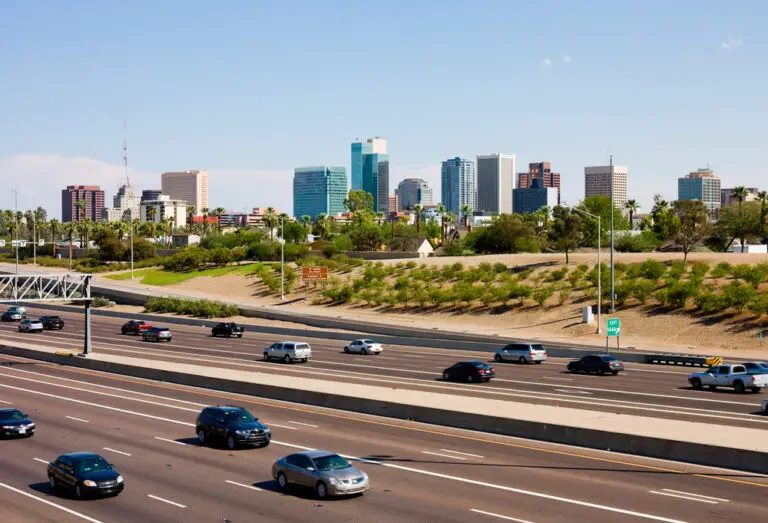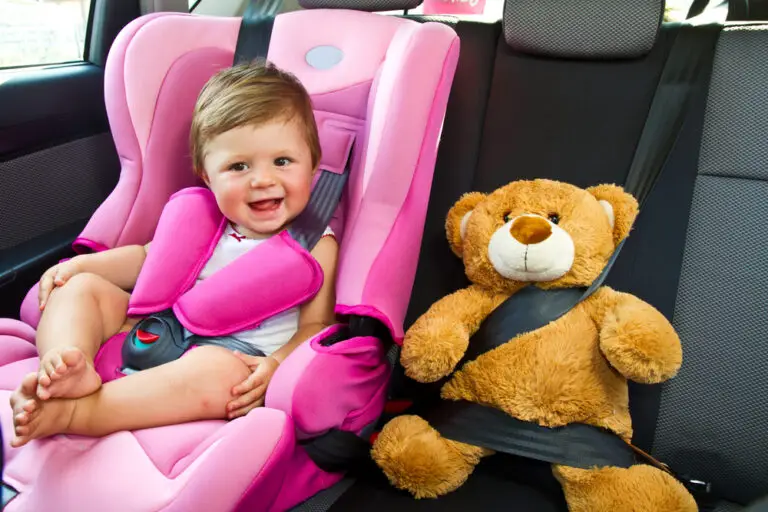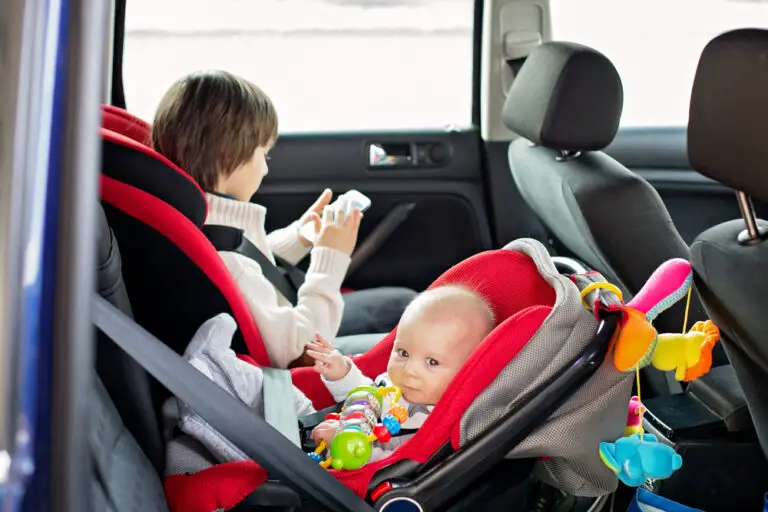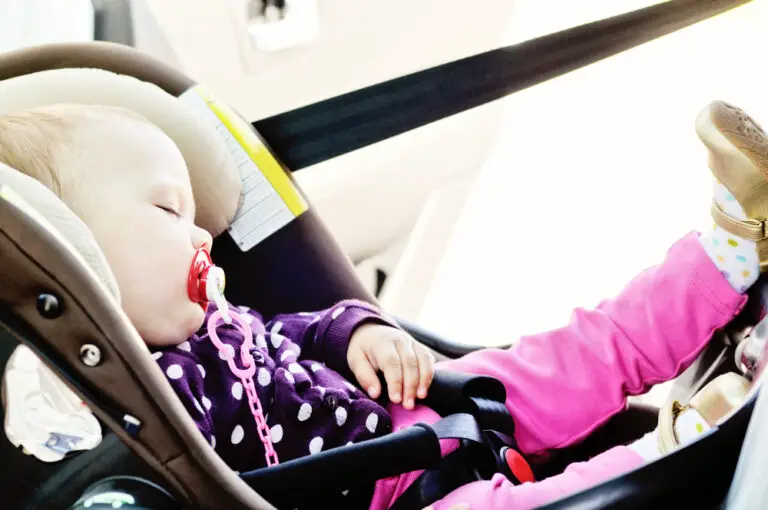Virginia Car Seat Laws 2024 (Rear, Forward & Booster)

Under Virginia car seat laws, the driver of the motor vehicle has to ensure that all children up to the age of 8 years are properly restrained in a child restraint. There is a $50 fine for the first offense. A second and subsequent offense carries a maximum fine of $500.
Disclaimer: This content does not constitute legal advice. It is solely for informational purposes. Always check the original source of the law for the latest version.
- Rear-Facing
- Forward-Facing
- Booster
- Front Seat
- Seat Belt
- Taxi Seat
- Ridesharing Seat
- Replacement
- Alone in Car
- Choosing a Seat
- Installation Help
Virginia Car Seat Laws
Virginia Rear-Facing Car Seat Law
According to the rear-facing car seat law in Virginia, all children who are under the age of 2 years or have reached the minimum weight limit of a forward-facing seat must be restrained in an infant rear-facing seat. (1)
It must always be placed in the back seat of the vehicle and never in front of a passenger-side airbag.
The rear-facing car seat age in Virginia is 2 years. But it is better for the child to ride rear-facing for as long as possible.
Once they outgrow the upper height and weight limits prescribed by the manufacturer, they can move to a forward-facing seat.
The first violation of Virginia rear-facing child seat law carries a civil penalty of $50. A second or subsequent violation will be fined a maximum of $500.
Age: Newborn to 2 years
Penalty: $50 for a first-time, maximum $500 for a second or repeat violation
Virginia Forward-Facing Car Seat Law
There is no definite forward-facing car seat law in Virginia. But as per Virginia child seat laws, children under 8 years old should ride in a forward-facing car seat once they outgrow the maximum weight and height limits of their rear-facing seats. (1)
In the absence of Virginia forward-facing child seat law, you can refer to the pointers given by the Virginia Department of Health. It recommends using a 5-point harness in the backseat. (2)
The forward-facing car seat age in Virginia is not stated. It is best to follow the National Highway Transport Safety Administration (NHTSA) recommendations and keep your child in a forward-facing seat for as long as it is allowed.
A violation of these Virginia car seat regulations carries a civil penalty of $50 for the first offense and a maximum $500 for a second or subsequent offense.
Age: Less than 8 years
Penalty: $50 for a first-time, maximum $500 for a second or repeat violation
Virginia Booster Seat Law
There is no definite child booster seat law in Virginia. The car seat laws in Virginia require children less than 8 years old to be secured in a child restraint. (1)
The Virginia Department of Health recommends children ride in a high back or backless booster seat once they have crossed the maximum height and weight limits of their forward-facing seats. (2)
Though the booster seat age in Virginia is not specific, the NHTSA recommends keeping children in a booster seat till the seat belt fits them correctly. A child who is physically or medically unable to sit in a booster seat is exempt from Virginia booster seat requirements.
A violation of the law will be fined $50, while a second or subsequent offense carries a maximum penalty of $500. There is an additional $20 penalty for failure to carry a written statement of exemption from a licensed physician.
Age: Under 8 years
Penalty: $50 for a first-time, maximum $500 for a second or repeat violation
Virginia Child Front Seat Law
According to the child front seat law in Virginia, all children under 8 years old have to ride in a car seat in the back seat of the vehicle. (1)
In case the vehicle does not have a backseat, the car seat may be placed in the front only if there is no passenger side airbag or the airbag has been deactivated.
The front seat age in Virginia is not specific. Children have to ride in the backseat as long as they are using a child restraint device.
The American Academy of Pediatrics (AAP) recommends that a child should sit in the back seat till at least 13 years of age. They must be secured in an appropriate car seat as per their height and weight requirements.
Age: Under 8 years
Penalty: $50 for a first-time, maximum $500 for a second or repeat violation
Virginia Child Seat Belt Law
According to the child seat belt law in Virginia, children from ages 8 through 17 years have to wear an adult safety belt. (1) They have to be secured whether they are in the front seat or the backseat.
Virginia children’s seat belt law is primary enforcement. Law enforcement officers can stop you if your child is not buckled up.
Seat belt rules in Virginia don’t apply to vehicles of emergency medical services, fire department or law enforcement agencies when performing their duties. Vehicles such as taxicabs, school buses, executive sedans, or limousines are also exempt.
If your child is not wearing a seatbelt, you will be penalized for disobeying the legal requirements. A first violation carries a civil penalty of $50 while a second or subsequent violation carries a penalty of maximum $500.
Age: 8 to 17 years
Penalty: $50 for a first-time, maximum $500 for a second or repeat violation
Virginia Taxi Child Seat Law
According to the taxi child seat law in Virginia, taxis are exempt from having child passenger restraint.
Virginia state law expressly exempts taxicabs from its ambit. Hence, the taxi driver cannot be held responsible for not having a taxi child seat in Virginia.
Despite the exception, you should carry an appropriate car seat for your child when traveling in a taxi. You may refer to the NHTSA recommendations and get a federally approved car seat.
If your child is less than 2 years old, they should ride in a rear-facing seat. Once they outgrow it, move them to a forward-facing seat with a harness. After they reach their maximum limits, secure them in a booster seat with a seat belt.
You can ask the taxi driver for help with car seat installation.
Virginia Ridesharing Child Seat Law
The ridesharing child seat law in Virginia is unclear. The law does not mention ridesharing services such as Uber and Lyft. It states that a driver transporting children up to the age of 8 years should secure them in a child seat. (1)
Even though it is not clear if child seat requirements in Virginia apply to rideshare services, it is best for either the driver or the parent/caregivers to provide a car seat that is appropriate for the child.
As a parent, make sure to check with the rideshare driver if they have an appropriate car seat or if you would have to carry your own.
There is a civil penalty of $50 for a first violation of the law. A second and subsequent violation can result in a maximum fine of $500.
Virginia Child Seat Replacement Law
There is no express child seat replacement law in Virginia. However, the NHTSA recommends child seat replacement after an accident.
This especially holds weight if your vehicle is involved in a moderate or severe accident in Virginia. This is because the car seat may have defects that are not easily visible.
In case of a low-impact accident, there is no urgent need to replace the child safety seat.
A crash is said to be a low-impact one when no passenger sustains injuries, the airbags didn’t deploy, there was no damage to the car seat and the vehicle could be driven away from the crash site.
You must also replace the car seat after it has passed its expiry date stated by the manufacturer or your child has outgrown it.
Leaving Child in The Car in Virginia
There is no specific law on leaving a child in a vehicle in Virginia.
The AAP has highlighted the dangers of leaving a child unattended in a vehicle. They may suffer heatstroke, get kidnapped or trapped in the vehicle, or set the vehicle in motion. Power windows and seat belts also pose a risk.
Heatstroke is the most common danger. The temperature inside the vehicle can rise quickly, due to which the child may suffer heatstroke. This can cause severe brain injury or even death.
While leaving a child in the car in Virginia is not illegal, it is an extremely dangerous practice. If the child is injured, the adult responsible for the act can face serious legal consequences such as child neglect.
Choosing a Child Car Seat in Virginia
For choosing a car seat in Virginia that can best protect your child, you may refer to the recommendations of the NHTSA.
A rear-facing infant seat is the best car seat to use in Virginia for children less than 2 years old. Once the child outgrows it, you can place them in a forward-facing seat with a harness.
Young children who have outgrown the forward-facing seats should be placed in a booster seat. You can choose either a backless or a high-back booster seat to protect the child’s head.
A versatile all-in-one seat may be the best booster seat to use in Virginia.
Car Seat Installation Help in Virginia
It is vital to follow the manufacturer’s instructions when installing child passenger safety seats in Virginia.
In addition, you should also refer to your vehicle manual to figure out how to safely secure the car seat. It is a complex process, and therefore, many car seats are incorrectly installed.
To get your car seat installed or inspected, you can visit a certified Child Passenger Safety Technician. In Virginia, the following are some of the places that you may visit:
- Department of Fire and Life Safety, York County
- Virginia Beach Fire Department
- Fairfax County Sheriff’s Office
- Henrico County
- Virginia Tech Police Department
Virginia Car Seat Safety Resources
- Virginia Department of Health: The Department provides a collection of resources such as safety tips, installation videos, and information on car seat recalls.
- Children’s Hospital of Richmond: A leading children’s hospital in Virginia, it also provides information about the law and the dos and don’ts of choosing a car seat.
- Children’s Hospital of The King’s Daughters: Its website has a comprehensive list of resources such as the latest law on car seats, inspection stations, car seat guidelines by age, and other safety tips.
- Albemarle County: The official website of the county contains best practices for each type of car seat.
FAQ
How long should a child ride in a rear-facing car seat in Virginia?
A child should ride rear-facing till they are at least 2 years old or reach the prescribed minimum weight limit of the forward-facing seat.
Can you put a rear-facing car seat in the front seat in Virginia?
You can put a rear-facing car seat in the front seat only if the vehicle does not have a backseat. The front passenger-side airbag must be deactivated.
Can you put a rear-facing car seat in the middle rear seat in Virginia?
You can put a rear-facing car seat in the middle rear seat only if it fits properly. You must go through the car seat as well as your vehicle’s manuals.
When can a baby face forward in a car seat in Virginia?
A baby can face forward in a car seat after they turn 2 years old or when they reach the minimum weight limits of a forward-facing seat.
How old for a booster seat in Virginia?
There is no particular age stated in the law. But a child can use a booster seat once they have outgrown their forward-facing car seat.
When to use a backless booster seat in Virginia?
You can use a backless booster seat if your vehicle seat has a headrest and the child’s ears are not higher than the seat back.
When can a child sit in the front seat in Virginia?
A child can sit in the front seat after they turn 8 years old or when the lap and shoulder seat belt fits properly across their collarbone, chest, and hips.
When can a child sit in the front seat with a booster in Virginia?
Children in booster seats should ride in the back. But if there is no backseat, they can ride in the front seat. The front passenger airbag must be deactivated.
When can a child stop using a booster seat in Virginia?
A child can stop using a booster once they turn 8 years old or have outgrown their booster seat and can safely wear the adult safety belt.
When to switch from 5 point harness to a seat belt in Virginia?
The ideal time is when the child outgrows the 5-point harness in a forward-facing seat. They can then switch to wearing a seatbelt in a booster seat.
When can a child use a regular seat belt in Virginia?
A child can use a regular seat belt once they are 8 years old or when the lap and shoulder seat belt fits properly across their collarbone, chest, and hips.
Do you need a car seat in a taxi in Virginia?
Taxis are exempt from having a car seat. But it is better for the parent/caregiver to carry an appropriate car seat when traveling with a child in a taxi.
Do you need a car seat in a Uber in Virginia?
The law is unclear. But either the caregiver or the driver should provide a federally approved and appropriate car seat to ensure the child’s safety.
Do you need a car seat in a Lyft in Virginia?
The law does not say anything. But it is better if the caregiver or driver can provide an appropriate car seat to ensure the child’s safety.

Rishima Rawat
Rishima Rawat is a lawyer and legal writer with over six years of writing and legal experience. She earned her LLB degree from the West Bengal National University of Juridical Sciences, Kolkata. With a passion for child safety, she’s written extensively about the U.S. car seat laws in ParentingMode. She collaborates with businesses and law firms globally, enhancing their online content. Her insights are also published in legal journals like RGNUL, NLIU, and RMLNLU Law Review. Committed to the cause of education, she has volunteered with IDIA, which helps underprivileged children in India to access legal education. She has also worked with Enhelion Knowledge Ventures, a leading legal ed-tech platform in India that provides students with affordable courses in law. Fluent in English and Hindi with elementary proficiency in Spanish, Rishima combines her legal expertise with a dedication to child safety.






